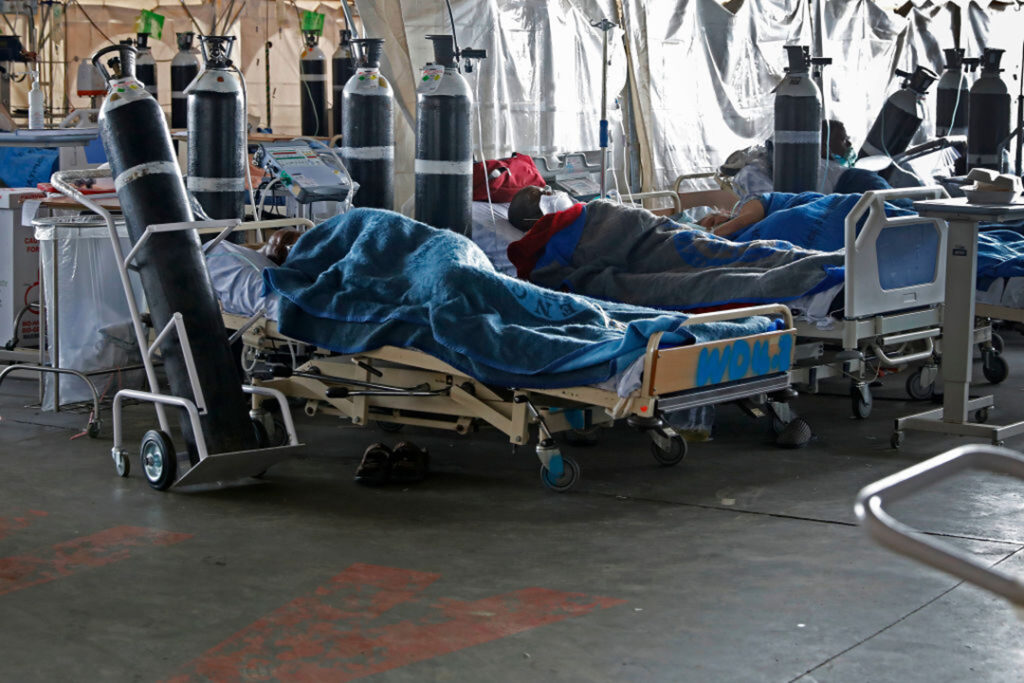ADF STAFF
The second wave of COVID-19 had not even peaked in South Africa when experts began warning of a third wave — and more — due to pandemic fatigue, a second strain of the virus and overwhelmed health systems.
Tivani Mashamba, a professor of diagnostic research at the University of Pretoria, is among those who believe COVID-19 will surge again in South Africa and around the Southern Hemisphere when winter hits in May and June.
“We are going to get a third wave, even a fourth,” Mashamba told The Guardian. “This pandemic has only just started.”
Other experts say the virus is following a pattern in which cases rise and then drop due to preventive measures only to rise again sharply after people relax their behavior. “People become very complacent when we pass a peak,” Alex van den Heever of Wits School of Governance in Johannesburg told the broadcaster SABC. “Their behavior changes back to normal behavior, which is natural, but it causes the second surge.”
Van den Heever fears that a third surge coming in the winter could be devastating. “Our winter surge will be very difficult to contain because during winter it’s very difficult to stop super-spreading events,” he said. “People are indoors a lot more.”
All this comes as hospitals, particularly in the South African province of Gauteng, are at or above capacity. Outside Steve Biko Academic Hospital in Pretoria, critically ill COVID-19 patients were being treated in tents. Doctors there told the Daily Maverick that they were overworked and lacked personal protective equipment. They said the hospital was overcrowded as scores of new patients arrived daily, and the mortuary was full.
“The oxygen doesn’t work, the beds are horrible, there are not enough nurses and our doctors are overwhelmed,” said a woman who used the pseudonym Dr. Felicia to speak to the Daily Maverick. “I don’t know what to say. I am so tired. There is equipment that is failing.”
The pandemic’s first wave mostly spared South Africa’s rural Limpopo province, but by mid-January, Mashamba said, everyone in the community knew someone who had died from COVID-19.
“Covid fatigue was a big factor,” Mashamba told The Guardian. “I was invited to baby showers. I thought: This is horrendous, you’re exposing pregnant women” to the virus.
Talking in a full waiting room where some virus patients had been waiting for a bed for days, Suzan Mukonkole, a doctor at Khayelitsha Hospital in Western Cape, told Deutsche Welle he was exhausted and that one-third of his colleagues have had COVID-19.
“Sometimes we don’t have enough space, sometimes we don’t have enough oxygen tanks and we need to improvise,” Mukonkole said. “Sometimes we have to choose who gets oxygen first and who should wait. That is very stressful.”
The new virus strain has been reported in each of South Africa’s nine provinces, and some scientists fear it is more contagious than the first strain and could fuel a third wave. South African President Cyril Ramaphosa struck a hopeful chord in a letter to his countrymen in mid-January saying that South Africans now understand the risks of attending “super-spreader” events and not wearing masks.
“This bodes well for the year ahead. We now know much more about the disease and how to prevent its spread. And despite what one could call ‘pandemic fatigue,’ we are no less determined as South Africans to do what needs to be done,” Rampahosa wrote, adding that a mass vaccination campaign will only augment that mindset.
The government announced it will receive 1.5 million doses of the AstraZenenca vaccine from the Serum Institute of India for its health workers in January, and authorities said the country has secured 20 million vaccine doses that will be delivered later this year, according to Quartz Africa.
“As more and more people are vaccinated, we will both save lives and progressively reduce the risk of infection across the population,” Ramaphosa wrote.

